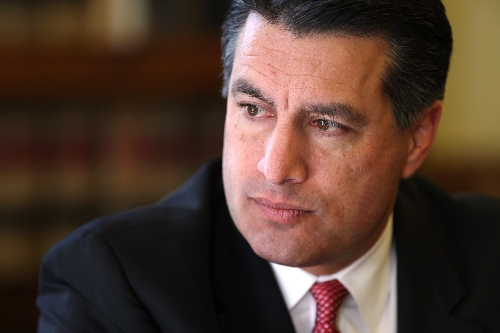Medicaid cuts look inevitable
Expect Nevada's medical establishment to start making noise in Carson City about looming cuts to the amount of money the state sets aside for Medicaid reimbursement.
Hospitals and other health care providers are hearing Gov. Brian Sandoval's plans to cut reimbursement money by 5 percent to 10 percent as part of his effort to balance an upside down state budget while keeping a promise not to raise taxes or fees.
Sandoval adviser Dale Erquiaga said he wouldn't comment on proposed cuts until Jan. 24, when the governor is set to unveil his budget during his State of the State speech.
But that hasn't stopped medical providers from sounding the alarm that balancing the budget with Medicaid cuts doesn't really reduce spending; it simply shifts it onto hospitals and, in the case of University Medical Center in Las Vegas, the taxpayers of Clark County.
"It becomes part of your negative margin," said UMC chief executive Kathy Silver.
The hospital lost nearly $72 million in fiscal year 2010, a loss that gets passed on to county taxpayers.
Medicaid reimbursements have fallen about 25 percent since 2006, Silver said, and don't come close to covering the cost of providing care.
Further cuts will increase the gap and raise the amount that falls to local taxpayers.
There could be more costs pushed onto patients and shareholders of private hospitals.
Hospitals are already under pressure to cut services for which payments don't cover costs. Medicaid cuts only increase that pressure, said James Wadhams, a lobbyist for the Nevada Hospital Association.
"It creates real serious problems for access to care for the Medicaid population," Wadhams said.
But Medicaid must be on the table if Sandoval is serious about keeping his promise to balance the budget without tax increases, said newly elected Sen. Ben Kieckhefer, R-Reno, who formerly worked for the state Department of Health and Human Services.
"You can't talk about really significant budget cuts without looking at Medicaid," he said.
That's because Medicaid payments make up more than 15 percent of the state general fund, and there aren't many options for reducing them.
In fiscal year 2010, Medicaid spending in Nevada was nearly $1.5 billion, about 36 percent of which came from the state.
When the state accepted money from the American Recovery and Reinvestment Act, it became obligated to not restrict eligibility, eliminating one potential option to cut spending.
Another way is to cut optional services, but that would mean talk of eliminating coverage for things like home health care for disabled elderly people, prescription drug assistance and other services that would be difficult to cut without paying a political price.
That leaves cutting the amount the state reimburses providers, Kieckhefer said.
"It is a necessary thing to look at. But it does pose risk," he said. "When you reduce coverage, either doctors get compensated less or hospitals get compensated less."
Pressure on the health care system, especially providers that serve the poor, will only increase in the upcoming budget biennium.
Nevada has about 275,000 Medicaid recipients and is adding about 3,000 to 4,000 per month, said Mike Willden, director of the Health and Human Services Department.
And the percentage the federal government picks up will drop from 64 to 55 percent, he said.
It leaves Sandoval and his team to answer a difficult question, Willden said.
"Will the rates that we can afford to pay provide access to low income people to get the health care they need?"
-- Benjamin Spillman
A bill in the Nevada Legislature would outlaw workplace bullying in all forms and add height and weight to the list of characteristics protected by anti-discrimination laws.
The sponsor, Assemblyman Tick Segerblom, D-Las Vegas, says the bill would make it easier for workplace bullying victims to seek redress and reduce incidents of discrimination against short and overweight people.
When it comes to bullying, Segerblom, an attorney who specializes in helping people making employment discrimination and harassment claims, says existing laws that protect people from harassment because of gender, sexual orientation or race aren't enough.
"The reality is that bullying is a problem. A lot of people are harassed unmercifully and have no recourse," he said. "They can't prove it is because of their age, sex, race or gender."
Under AB90, victims wouldn't have to prove the bullying was for a specific reason.
As for discrimination against short and overweight people, Segerblom says it is a problem that needs to be addressed.
"There are a lot of overweight people; they are just routinely denied jobs," he said. "Those people have a right to work like anybody."
Peggy Howell, a Las Vegas-based spokeswoman for the National Association to Advance Fat Acceptance, said discrimination against overweight people is a serious problem.
She pointed to a 2008 report from the Rudd Center for Food Policy and Obesity at Yale University that cited studies on the issue.
According to the report, overweight people earn up to 6 percent less than nonoverweight people doing the same job, they are viewed as lazy and less competent than nonoverweight people and can be fired or suspended from work for their weight despite good job performance.
"There is lots of name calling, lots of bullying and tormenting that goes on for life in general for a fat person," Howell said.
She said the workplace discrimination is particularly unfair because in many cases people are overweight because of side effects of certain prescriptions or other factors beyond their control.
Meanwhile, people who smoke, abuse alcohol or use illegal drugs can have their unhealthy choices go undetected because there is no visible evidence.
Still, the bill raises concerns that it would put Nevada at a disadvantage in attracting new jobs to the state because it would increase the cost of doing business in the state.
Gregory Kamer, an attorney who specializes in employment law, says if Segerblom's bill became law it would burden employers with higher costs and make it harder to recruit new companies and create jobs.
"You are creating an opportunity for both plaintiff's lawyers and individuals to have one more basis to sue their employers for damages," Kamer said. "It will keep businesses out of Nevada."
Segerblom introduced a similar measure during the 2009 legislative session, but it didn't get a committee hearing. The new bill was referred to the Committee on Commerce and Labor.
-- Benjamin Spillman
Clark County Commissioner Chris Giunchigliani, who initially ruled out running for Las Vegas mayor this year, is now considering the race.
"I'm changing my mind enough to put my toe in the water," she said Thursday. "You should never say never until at least you've decided where you would be the most productive."
Term limits prevent Mayor Oscar Goodman from seeking a fourth term.
So far, the list of declared candidates includes Larry Brown, also a county commissioner and a former Las Vegas City Council member; City Councilman Steve Ross; real estate agent Marlene Rogoff; Las Vegas Green Chamber of Commerce founder Katherine Duncan; and Anthony Wernicke, who previously ran for state Senate.
Giunchigliani said she wants to measure her name recognition in the city and "get a better handle on neighborhood issues," since she is used to dealing with sprawling Clark County.
Filing for city elections will take place Jan. 25 to Feb. 4.
-- Alan Choate
Contact reporter Benjamin Spillman at bspillman@reviewjournal.com or 702-477-3861. Contact reporter Alan Choate at achoate@reviewjournal.com or 702-229-6435.
Political Eye blog


















